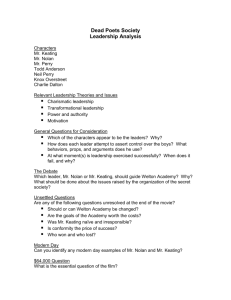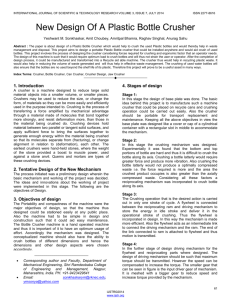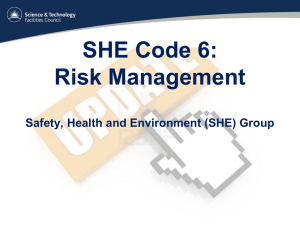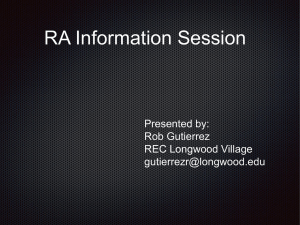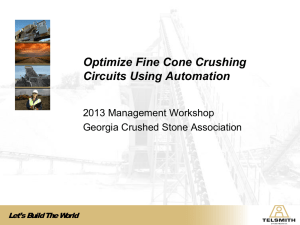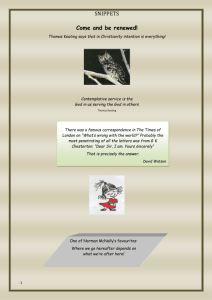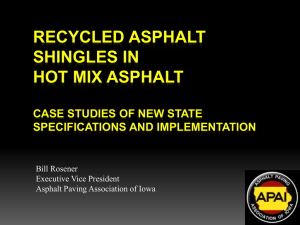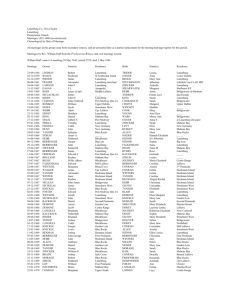MQP_Poster
advertisement
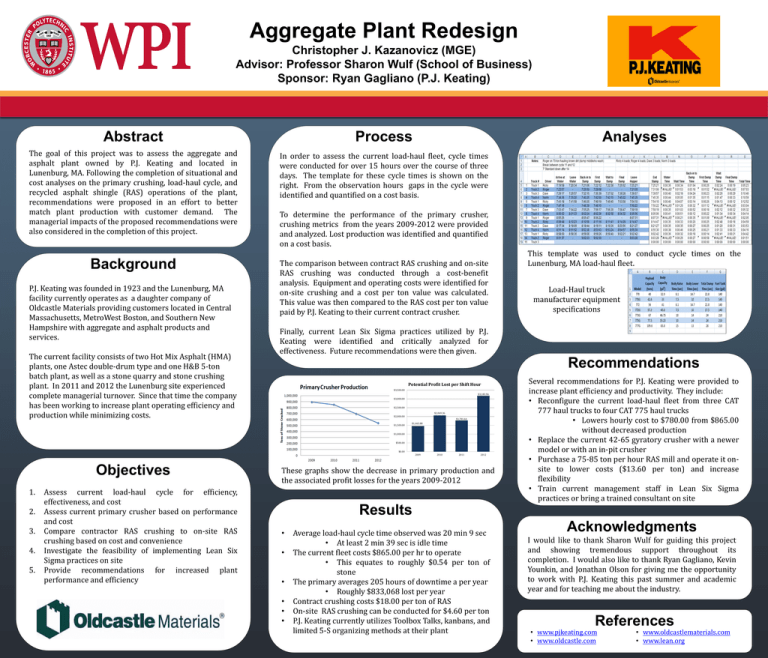
Aggregate Plant Redesign Christopher J. Kazanovicz (MGE) Advisor: Professor Sharon Wulf (School of Business) Sponsor: Ryan Gagliano (P.J. Keating) Abstract Process The goal of this project was to assess the aggregate and asphalt plant owned by P.J. Keating and located in Lunenburg, MA. Following the completion of situational and cost analyses on the primary crushing, load-haul cycle, and recycled asphalt shingle (RAS) operations of the plant, recommendations were proposed in an effort to better match plant production with customer demand. The managerial impacts of the proposed recommendations were also considered in the completion of this project. In order to assess the current load-haul fleet, cycle times were conducted for over 15 hours over the course of three days. The template for these cycle times is shown on the right. From the observation hours gaps in the cycle were identified and quantified on a cost basis. Background P.J. Keating was founded in 1923 and the Lunenburg, MA facility currently operates as a daughter company of Oldcastle Materials providing customers located in Central Massachusetts, MetroWest Boston, and Southern New Hampshire with aggregate and asphalt products and services. The current facility consists of two Hot Mix Asphalt (HMA) plants, one Astec double-drum type and one H&B 5-ton batch plant, as well as a stone quarry and stone crushing plant. In 2011 and 2012 the Lunenburg site experienced complete managerial turnover. Since that time the company has been working to increase plant operating efficiency and production while minimizing costs. Analyses To determine the performance of the primary crusher, crushing metrics from the years 2009-2012 were provided and analyzed. Lost production was identified and quantified on a cost basis. The comparison between contract RAS crushing and on-site RAS crushing was conducted through a cost-benefit analysis. Equipment and operating costs were identified for on-site crushing and a cost per ton value was calculated. This value was then compared to the RAS cost per ton value paid by P.J. Keating to their current contract crusher. Recommendations Potential Profit Lost per Shift Hour $3,500.00 $3,183.96 $3,000.00 $2,500.00 $2,069.36 $2,000.00 $1,781.64 $1,463.88 $1,000.00 $500.00 $0.00 2009 1. 2. 3. 4. 5. Assess current load-haul cycle for efficiency, effectiveness, and cost Assess current primary crusher based on performance and cost Compare contractor RAS crushing to on-site RAS crushing based on cost and convenience Investigate the feasibility of implementing Lean Six Sigma practices on site Provide recommendations for increased plant performance and efficiency Load-Haul truck manufacturer equipment specifications Finally, current Lean Six Sigma practices utilized by P.J. Keating were identified and critically analyzed for effectiveness. Future recommendations were then given. $1,500.00 Objectives This template was used to conduct cycle times on the Lunenburg, MA load-haul fleet. 2010 2011 2012 These graphs show the decrease in primary production and the associated profit losses for the years 2009-2012 Several recommendations for P.J. Keating were provided to increase plant efficiency and productivity. They include: • Reconfigure the current load-haul fleet from three CAT 777 haul trucks to four CAT 775 haul trucks • Lowers hourly cost to $780.00 from $865.00 without decreased production • Replace the current 42-65 gyratory crusher with a newer model or with an in-pit crusher • Purchase a 75-85 ton per hour RAS mill and operate it onsite to lower costs ($13.60 per ton) and increase flexibility • Train current management staff in Lean Six Sigma practices or bring a trained consultant on site Results • • • • • • Average load-haul cycle time observed was 20 min 9 sec • At least 2 min 39 sec is idle time The current fleet costs $865.00 per hr to operate • This equates to roughly $0.54 per ton of stone The primary averages 205 hours of downtime a per year • Roughly $833,068 lost per year Contract crushing costs $18.00 per ton of RAS On-site RAS crushing can be conducted for $4.60 per ton P.J. Keating currently utilizes Toolbox Talks, kanbans, and limited 5-S organizing methods at their plant Acknowledgments I would like to thank Sharon Wulf for guiding this project and showing tremendous support throughout its completion. I would also like to thank Ryan Gagliano, Kevin Younkin, and Jonathan Olson for giving me the opportunity to work with P.J. Keating this past summer and academic year and for teaching me about the industry. References • www.pjkeating.com • www.oldcastle.com • www.oldcastlematerials.com • www.lean.org
